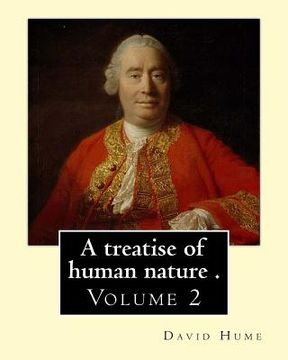A treatise of human nature . By: David Hume, edited By: Ernest Rhys (Volume 2).: Hector Hugh Munro (18 December 1870 - 14 November 1916), better known (in English)
Synopsis "A treatise of human nature . By: David Hume, edited By: Ernest Rhys (Volume 2).: Hector Hugh Munro (18 December 1870 - 14 November 1916), better known (in English)"
A Treatise of Human Nature (1738-40) is a book by Scottish philosopher David Hume, considered by many to be Hume's most important work and one of the most influential works in the history of philosophy. The Treatise is a classic statement of philosophical empiricism, skepticism, and naturalism. In the introduction Hume presents the idea of placing all science and philosophy on a novel foundation: namely, an empirical investigation into human nature. Impressed by Isaac Newton's achievements in the physical sciences, Hume sought to introduce the same experimental method of reasoning into the study of human psychology, with the aim of discovering the "extent and force of human understanding". Against the philosophical rationalists, Hume argues that passion rather than reason governs human behaviour. He introduces the famous problem of induction, arguing that inductive reasoning and our beliefs regarding cause and effect cannot be justified by reason; instead, our faith in induction and causation is the result of mental habit and custom. Hume defends a sentimentalist account of morality, arguing that ethics is based on sentiment and passion rather than reason, and famously declaring that "reason is, and ought only to be the slave to the passions". Hume also offers a skeptical theory of personal identity and a compatibilist account of free will. Contemporary philosophers have written of Hume that "no man has influenced the history of philosophy to a deeper or more disturbing degree", and that Hume's Treatise is "the founding document of cognitive science" and the "most important philosophical work written in English." However, the public in Britain at the time did not agree, and the Treatise was a commercial failure. Deciding that the Treatise had problems of style rather than of content, Hume reworked some of the material for more popular consumption in An Enquiry Concerning Human Understanding (1748) and An Enquiry Concerning the Principles of Morals (1751), which Hume wrote is "of all my writings, historical, philosophical, or literary, incomparably the best."........... Hector Hugh Munro (18 December 1870 - 14 November 1916), better known by the pen name Saki, and also frequently as H. H. Munro, was a British writer whose witty, mischievous and sometimes macabre stories satirize Edwardian society and culture. He is considered a master of the short story, and often compared to O. Henry[citation needed] and Dorothy Parker[citation needed]. Influenced by Oscar Wilde, Lewis Carroll and Rudyard Kipling, he himself influenced A. A. Milne, Noël Coward and P. G. Wodehouse. Besides his short stories (which were first published in newspapers, as was customary at the time, and then collected into several volumes), he wrote a full-length play, The Watched Pot, in collaboration with Charles Maude; two one-act plays; a historical study, The Rise of the Russian Empire, the only book published under his own name; a short novel, The Unbearable Bassington; the episodic The Westminster Alice (a parliamentary parody of Alice in Wonderland); and When William Came, subtitled A Story of London Under the Hohenzollerns, a fantasy about a future German invasion and occupation of Britain....... Ernest Percival Rhys ( 17 July 1859 - 25 May 1946) was a Welsh-English writer, best known for his role as founding editor of the Everyman's Library series of affordable classics. He wrote essays, stories, poetry, novels and plays............

